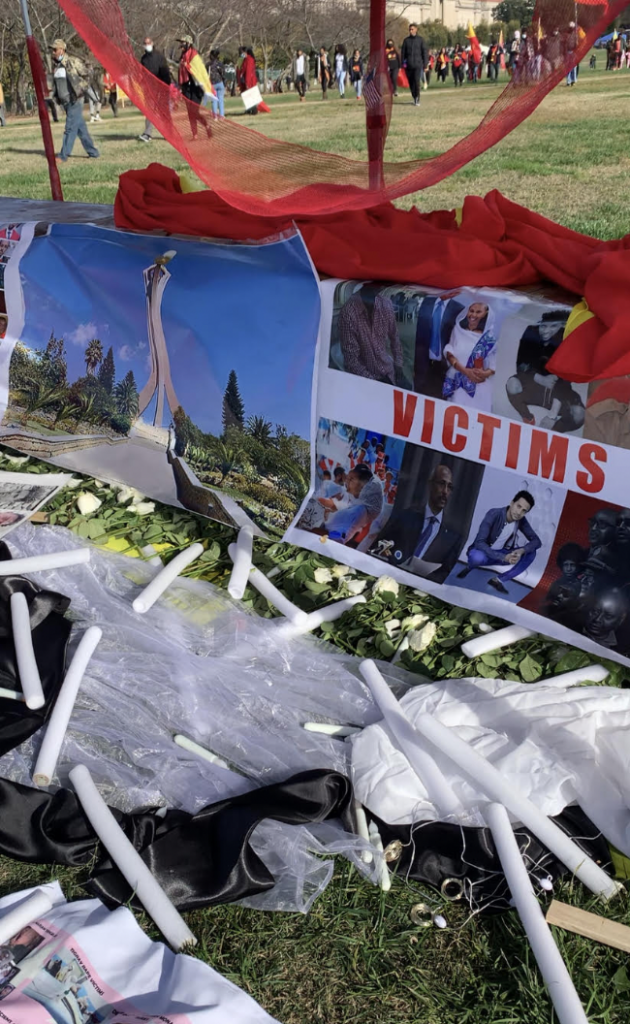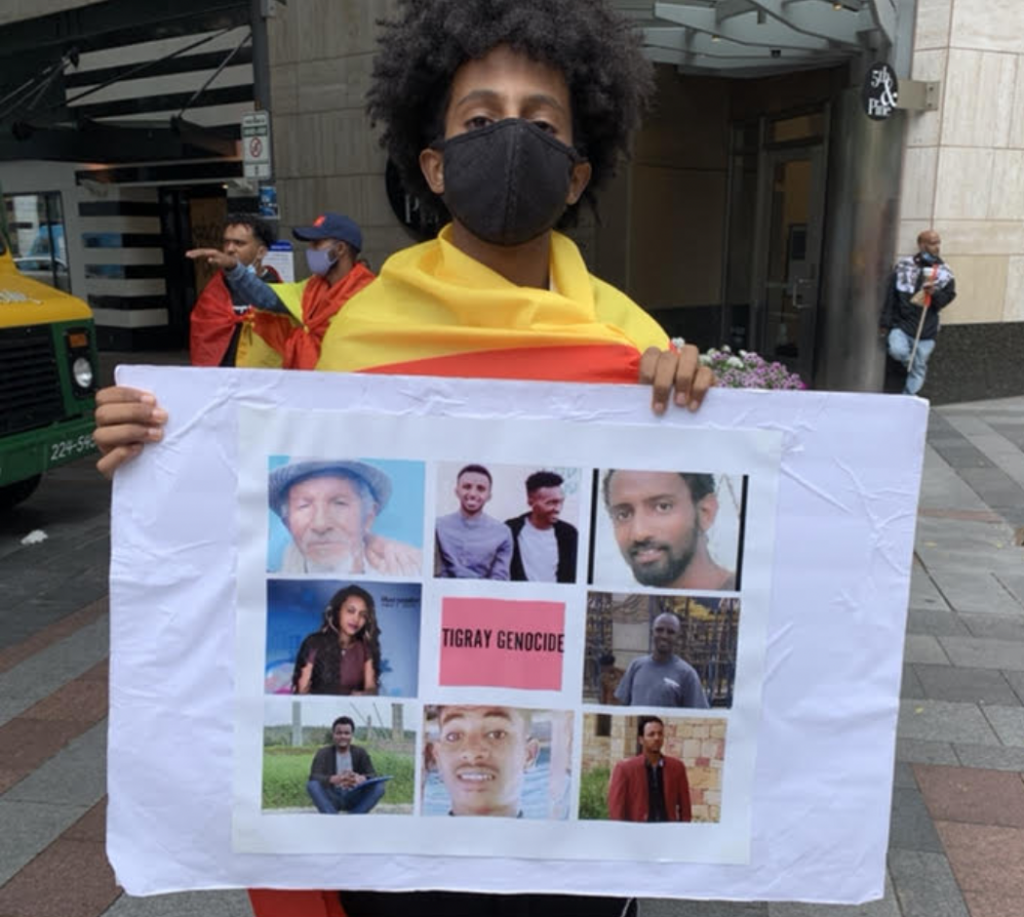CW: This article discusses genocide and violence. Please refer to the end of the article for on- and off-campus resources.
Every day is full of uncertainty for Daniel Hagos (GRD ’23), a Georgetown University student activist with family in Tigray, the northernmost state of Ethiopia currently in the midst of a state-sponsored genocide.
Ethiopian government forces have killed more than half a million noncombatants in the Tigray genocide, which has quickly become the deadliest war of the 21st century. Hagos said looming threats of the ongoing violence in Tigray deeply impact Georgetown community members with ties to the region.
“You don’t know whether or not, at the end of all this, if you’ll have an entire family to go back to or whether they have been physically disabled because of violence or their health is completely compromised,” Hagos told The Hoya.
Ethiopian Prime Minister Abiy Ahmed declared war Nov. 4, 2020 on the Tigray People’s Liberation Front (TPLF), the ruling political party that’s advocating for the Ethiopian federal government to recognize Tigray’s state rights. Ahmed’s order of a military offensive came as a response to TPLF protests in support of Tigray’s autonomy, as TPLF feared that Ahmed intended to disempower the historically marginalized Tigrayans.
The Tigrayan people continue to endure state violence even after reaching a peace agreement with the Ethiopian government in November 2022 two years into the civil war, resulting in a lack of access to medical care, starvation, sexual assault and media blackouts.
Despite the peace agreement that the Ethiopian government and TPLF reached over four months ago, Hagos said his contacts in the region have not seen these diplomatic deals translate into tangible improvement on the ground.
“They will flat out tell you the material conditions really haven’t changed all that much,” Hagos said. “The bloodshed, that is the number of troops and the air bombardments? Yeah, that has slowed down, but you can still suffocate a population through other means.”

State military officials continue to commit mass atrocities and systematically persecute individuals because of their Tigrayan ethnicity, according to Hagos.
“They went home to home, gathered Tigrayans and slaughtered them, whether it was through bullets, whether it was gathering men and killing them and then tossing their bodies off the cliff,” Hagos said. “And then ultimately, if folks were spared, if they didn’t die, then they face profiling. So if you’re in the capital of Ethiopia, and you’re known to be of Tigrayan identity, they rounded you up and put you in the equivalent of a concentration camp.”
Melanne Verveer, the executive director for the Georgetown Institute for Women, Peace and Security and former President Barack Obama’s appointee for the first U.S. ambassador for global women’s issues, said sexual violence is used as a tool of war against the women of Tigray to force its people into submission to the Ethiopian government.
“Their bodies were the battlefield,” Verveer told The Hoya. “The conflict-related sexual violence was horrific.”
Hagos is calling on Georgetown University graduates in governmental positions of power to take action against the ongoing genocide.
Due to the university’s strong influence in international affairs, Hagos, who has worked with different members of U.S. Congress on legislation to hold Ethiopia accountable, said he believes Georgetown’s powerful graduates should be doing more to provide aid to Tigray.
“The one part that really hurts the most is that it’s former alums of Georgetown that sit in pretty prominent roles, either past or present, that could have definitely influenced the outcome of this war,” Hagos said. “And that’s been probably the most deeply upsetting part as it relates to my connection to this institution. There’s folks who have ties to this university that turned a blind eye or chose not to speak up.”
Georgetown graduates and faculty currently hold 28 seats in the 118th U.S. Congress. The university ranks first for the number of chiefs of staff serving in U.S. Congress and second as a producer of congressional members and staffers.
“Georgetown is so uniquely positioned to say something and do something and be a little bit more firm about it,” Hagos added. “But it hasn’t been the case.”
Although Georgetown has not issued an official statement on the genocide, some university-affiliated institutes have engaged in efforts to raise awareness for the conflict, according to a university spokesperson.
“Many academic centers on campus have held programming on this issue over the last several years, including the Berkley Center for Religion, Peace & World Affairs and the Georgetown Institute for Women, Peace and Security (GIWPS),” a university spokesperson wrote to The Hoya.
Courses in the School of Foreign Service have also included the conflict in their curricula, the spokesperson said.
Hagos said the influence of Ethiopian propaganda, U.S. geopolitical interests and stereotypes around Africa as a continent perpetually at war have contributed to why there has been minimal coverage of the genocide.
Building empathy for the Tigrayan conflict is difficult when the United States has also faced criticism for using state violence to discriminate against Black lives, Hagos said.
“And so if we struggle with that, here in the states, we’re asking for attention several thousand miles away in the Horn of Africa, it’s going to be hard to garner a captive audience,” Hagos said.
Troops from the neighboring nation Eritrea, which has long harbored animosity against the TPLF, have aided Ahmed in his attacks against the Tigray region. Eritrean soldiers have specifically targeted and displaced the Irob people, an ethnic minority within Tigray who live at the border between the two nations.
Tesfaye Awala, the board chair of Canada-based advocacy group The Irob Anina Civil Society, said the Eritrean invasion of the Irob region has included mass killings, rape and destruction of infrastructure.
“I can’t have any words to express how the Eritrean force behaves,” Awala told The Hoya.
Awala said the Eritrean government massacred five of his cousins.

After two years of no contact with his parents, who are still living in the Irob district of Tigray, Awala learned through a secondhand report that Eritrean forces beat his father nearly to the point of death.
“He played dead, they beat him so much,” Awala said. “He is in late 70s to early 80s. He was unconscious after they beat him.”
Awala said he was unable to talk to his father until three months after the incident, which is when he learned that his family could not find medical treatment even after seeking out hospitals in multiple nearby cities.
“There was no medical help,” Awala said. “Everything was looted and destroyed. I just got some information, secondhand information, that he is still alive but still without treatment and even his bones were broken.”
Awala said he fears the Irob ethnic group is under threat of complete disappearance if the violence continues.
“They have been attacked again and again by the Eritrean regime and the Eritrean regime seems to be so determined to erase this minority,” Awala said. “We want to be able to survive. It is very, very likely that this minority is going to be erased if there is no intervention sooner than later.”
Awala said international recognition of the conflict as a genocide is a key step toward securing stable humanitarian rights for Tigray.
“I think the first thing is to recognize what happened and call it a genocide,” Awala said. “That’s the start for more actions. The powers, especially the U.S., need to know there won’t be any sustainable peace without justice and accountability.”
Hagos said he considers Georgetown community members who continue to ignore this genocide to share culpability in perpetuating and enabling the violence.
“Every single alum of Georgetown, who works in the federal government, specifically the State Department, and has had any level of influence regarding Tigray, I hope that you continue to press the issue if you have been advocating for accountability, justice and peace,” Hagos said. “If you have stayed silent, in my opinion you are complicit.”
On-campus resources include Health Education Services (202-687-8949), Counseling and Psychiatric Service (202-687-6985) and Every Hoya Cares; additional off-campus resources include the National Alliance on Mental Illness DC (202-673-6495). You can donate to the Health Professionals Network for Tigray to support health care access in Tigray.








